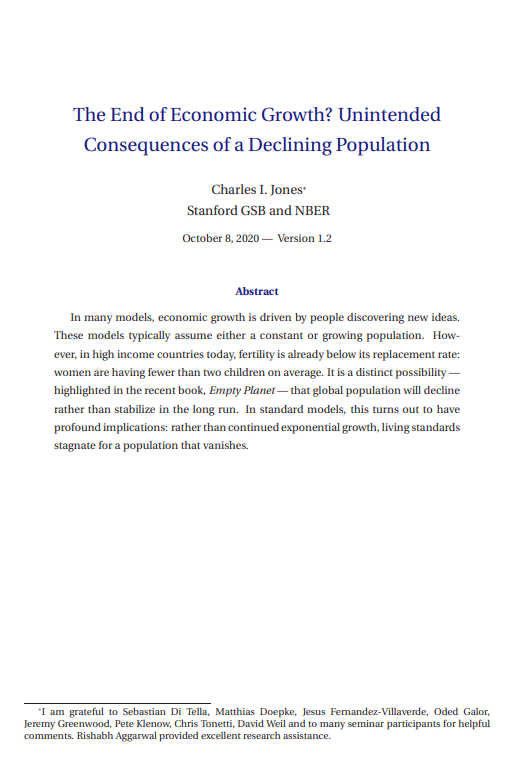The end of economic growth? Unintended consequences of a declining population
Charles I. Jones (Stanford University)
GPI Working Paper No. 13-2020 and published in the National Bureau of Economic Research Working Paper series
In many models, economic growth is driven by people discovering new ideas. These models typically assume either a constant or growing population. However, in high income countries today, fertility is already below its replacement rate: women are having fewer than two children on average. It is a distinct possibility — highlighted in the recent book, Empty Planet — that global population will decline rather than stabilize in the long run. In standard models, this turns out to have profound implications: rather than continued exponential growth, living standards stagnate for a population that vanishes.
Other working papers
How much should governments pay to prevent catastrophes? Longtermism’s limited role – Carl Shulman (Advisor, Open Philanthropy) and Elliott Thornley (Global Priorities Institute, University of Oxford)
Longtermists have argued that humanity should significantly increase its efforts to prevent catastrophes like nuclear wars, pandemics, and AI disasters. But one prominent longtermist argument overshoots this conclusion: the argument also implies that humanity should reduce the risk of existential catastrophe even at extreme cost to the present generation. This overshoot means that democratic governments cannot use the longtermist argument to guide their catastrophe policy. …
In defence of fanaticism – Hayden Wilkinson (Australian National University)
Consider a decision between: 1) a certainty of a moderately good outcome, such as one additional life saved; 2) a lottery which probably gives a worse outcome, but has a tiny probability of a far better outcome (perhaps trillions of blissful lives created). Which is morally better? Expected value theory (with a plausible axiology) judges (2) as better, no matter how tiny its probability of success. But this seems fanatical. So we may be tempted to abandon expected value theory…
The long-run relationship between per capita incomes and population size – Maya Eden (University of Zurich) and Kevin Kuruc (Population Wellbeing Initiative, University of Texas at Austin)
The relationship between the human population size and per capita incomes has long been debated. Two competing forces feature prominently in these discussions. On the one hand, a larger population means that limited natural resources must be shared among more people. On the other hand, more people means more innovation and faster technological progress, other things equal. We study a model that features both of these channels. A calibration suggests that, in the long run, (marginal) increases in population would…

